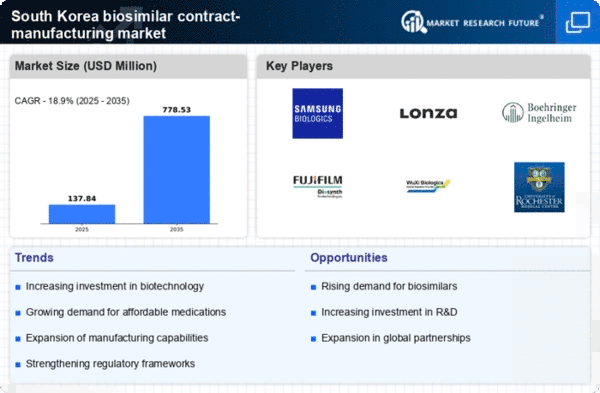Increasing Healthcare Expenditure
The rising healthcare expenditure in South Korea is a pivotal driver for the biosimilar contract-manufacturing market. As the government allocates more funds towards healthcare, the demand for affordable treatment options intensifies. In 2025, healthcare spending is projected to reach approximately $200 billion, reflecting a growth rate of around 5% annually. This increase in expenditure is likely to encourage healthcare providers to adopt biosimilars, which are generally more cost-effective than their reference biologics. Consequently, contract manufacturers are positioned to benefit from this trend, as they can offer tailored solutions to meet the growing demand for biosimilars. Thus, the biosimilar contract-manufacturing market is expected to expand. This growth is driven by the need for efficient production capabilities that align with the increasing healthcare budget.
Regulatory Framework Enhancements
Enhancements in the regulatory framework surrounding biosimilars in South Korea are fostering growth in the biosimilar contract-manufacturing market. The government has implemented streamlined approval processes and guidelines that facilitate the entry of biosimilars into the market. These regulatory improvements are designed to ensure safety and efficacy while expediting the availability of biosimilars to patients. As a result, the number of approved biosimilars has increased, leading to a more competitive market landscape. This regulatory support is likely to encourage contract manufacturers to invest in biosimilar production, as they can navigate the approval process more efficiently. The biosimilar contract-manufacturing market is thus benefiting from a more favorable regulatory environment that promotes innovation and accessibility.
Aging Population and Chronic Diseases
The aging population in South Korea is a critical driver for the biosimilar contract-manufacturing market. With a significant portion of the population over 65 years old, the prevalence of chronic diseases such as diabetes and cancer is on the rise. This demographic shift is expected to increase the demand for biologic therapies, including biosimilars, which are often more affordable alternatives. By 2025, it is estimated that nearly 20% of the population will be aged 65 and older, further amplifying the need for cost-effective treatment options. As healthcare providers seek to manage the growing burden of chronic diseases, the biosimilar contract-manufacturing market is poised for expansion, driven by the need for scalable production of these essential therapies.
Growing Focus on Personalized Medicine
The growing focus on personalized medicine in South Korea is emerging as a significant driver for the biosimilar contract-manufacturing market. As healthcare shifts towards tailored therapies that cater to individual patient needs, the demand for biosimilars that can be customized is likely to increase. This trend is supported by advancements in genomics and biotechnology, which enable the development of more targeted treatments. The biosimilar contract-manufacturing market is expected to adapt to this shift by offering flexible manufacturing solutions that accommodate the production of personalized biosimilars. As healthcare providers seek to enhance patient outcomes through personalized approaches, the demand for contract manufacturing services in the biosimilar sector is anticipated to grow.
Technological Advancements in Manufacturing
Technological advancements in biomanufacturing processes are significantly influencing the biosimilar contract-manufacturing market. Innovations such as single-use technologies and continuous manufacturing are enhancing production efficiency and reducing costs. In South Korea, the adoption of these technologies is becoming more prevalent, with a reported increase in productivity by up to 30% in some facilities. This shift not only streamlines operations but also allows for quicker responses to market demands. As manufacturers leverage these advancements, they can produce high-quality biosimilars at a lower cost, making them more accessible to healthcare providers. Thus, the biosimilar contract-manufacturing market is likely to grow as companies invest in cutting-edge technologies to enhance their production capabilities.


















Leave a Comment